The gun has come to embody many contradictions over America’s history: individual liberty and the police state, empowerment and violence, defense and death. To understand America’s complicated culture of guns is an interdisciplinary pursuit: legal, historical, sociological, economic. The following books are all exemplary attempts at that understanding.
Article continues after advertisement
One might begin at the Second Amendment, with its disputed meaning and the intentions of the Framers, the inextricable way in which gun rights sought to preserve existing systems of oppression and power, namely slavery, and that still today arguments around guns are inherently racialized. Guns, too, have always been a commodity, and in many ways, the gun industry created gun culture as we know it. One third of adult Americans own a gun. The NRA wields unfathomable political power. And every single day, at the hands of our own inventions, one hundred Americans die, seven of whom are children.
*
Dominic Erdozain, One Nation Under Guns: How Gun Culture Distorts Our History and Threatens Our Democracy, 2024
One Nation Under Guns is a “brilliant and gut-wrenching” history and analysis of America’s gun culture as it has developed since the Second Amendment (The New York Times Book Review). The book opens with a man who is “a pillar of the gun culture,” an ex-Marine and columnist for Guns & Ammo, showing a Dutchman how to shoot a gun: “‘This… is what keeps our politicians from getting rid of the Bill of Rights,’” he says, referring to the semi-automatic rifle. Writer and historian Dominic Erdozain argues that “our interpretation of the right to bear arms has been not merely muddied but contrary to what most of the framers apparently intended.” The book “considers guns from cultural, legal and historical perspectives” in under 200 pages, situating each event in historical context, and examining each word of the Second Amendment; it “is so comprehensive and assured that the moment I finished it, I immediately went back to the beginning and read it again.” (The NYT Book Review)
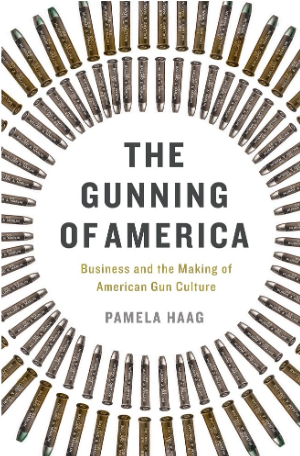
Pamela Haag, The Gunning of America: Business and the Making of American Gun Culture, 2016
It’s too easy to forget that even objects imbued with such political controversy, existential power and cultural deification as the “gun” are also products manufactured, goods—bought, sold and advertised. Pamela Haag’s The Gunning of America corrects “the perception of the gun’s inevitability in American life by showing its history as a commodity invented and then deliberately marketed and distributed like any other widget or household appliance.” (The New Republic). She contends that “the gun industry created, rather than responded to, America’s gun culture,” and “successfully exploited notions of frontier individualism, responsibility, and masculinity” to the exclusive benefit of the bottom line. Haag ascribes the origins of the gun industry to the Winchester Repeating Arms Company, illustrating how their business success calcified the American interest in the gun, as it is today.
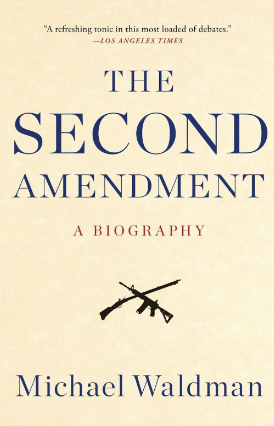
Michael Waldman, The Second Amendment: A Biography, 2014
The Second Amendment is a single, awkwardly constructed sentence of twenty-seven words, yet the history of its sustained interpretation and misinterpretation may reveal some essence of America. The Second Amendment: A Biography seeks to do so through careful historical analysis, depicting the transformation of belief “from defense of the homeland to defense of the home” (LA Times Book Review). Waldman, a constitutional lawyer and presidential speechwriter, insists “that the Second Amendment did not create an individual right to arms.” The book a “readable, often chatty, thoroughly documented recounting of the Second Amendment’s history shows it changing in character as American society changed” (The New York Times Book Review). How does the ongoing debate of this short text reflect an uneasiness at the root of the American identity?
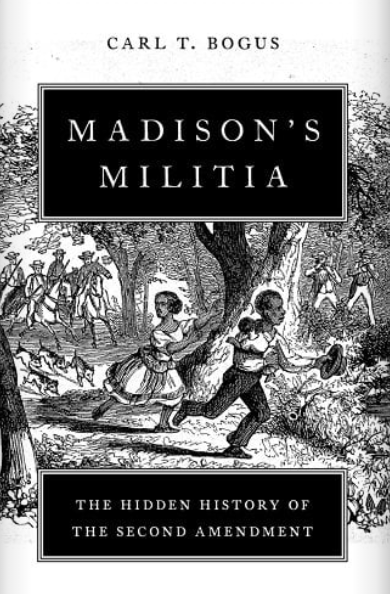
Carl T. Bogus, Madison’s Militia: The Hidden History of the Second Amendment, 2023
In Madison’s Militia, Carl T. Bogus shows that “the right to bear arms was not about protecting liberty but preserving slavery.” He argues that “a close examination of the context in which Madison drafted the Second Amendment reveals the text as an offering to white southerners preoccupied with containing slave rebellion and uneasy about losing control of the primary instrument for it, the militia” (The New England Quarterly). Carl T. Bogus is a professor of law emeritus at Roger Williams University, but Madison’s Militia is a history, told with the scrupulousness of a lawyer, “a surprisingly fast-paced account of the events leading up to the Second Amendment” (Jeannine DeLombard, author of In the Shadow of the Gallows).
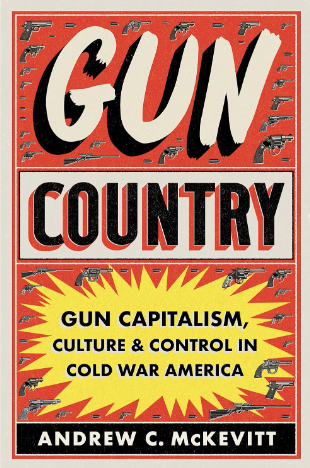
Andrew C. McKevitt, Gun Country: Gun Capitalism, Culture, and Control in Cold War, 2023
“Andrew McKevitt’s excellent Gun Country… insists on an often neglected fact: guns are a commodity” (London Review of Books). Gun Country “recasts the story of guns in postwar America as one of Cold War and racial anxieties, unfettered capitalism, and exceptional violence that continues to haunt us to this day.” Beginning in the 1950s, after the WWII, the book describes how “young gun entrepreneurs connected American desires and consumer demand with a previously unexploited source of supply: war surplus guns from around the world.” McKevitt, a professor of history, contends that “war made the gun country,” and then war “became a metaphor for understanding it.”
Shortlisted, 2024 Cundill History Prize • One of the Washington Post’s Notable Nonfiction Books of 2023
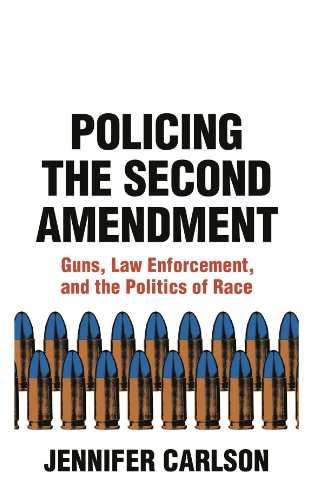
Jennifer Carlson, Policing the Second Amendment: Guns, Law Enforcement and the Politics of Race, 2020
Jennifer Carlson, professor of sociology and MacArthur Fellow, “shows how the politics of guns cannot be understood—or changed—without considering how the racial politics of crime affect police attitudes about guns” in Policing the Second Amendment. A sociological study, Carlson interviewed close to eighty police chiefs, and conducted extensive archival research, to dissect the racism that undergirds policing, and hence—the gun debate. She “reveals the troubling racial politics that animate gun laws and legitimize lethal state violence” (Forrest Stuart, author of Ballad of the Bullet). Carlson’s other two books also deal with guns in America: Citizen-Protectors: The Everyday Politics of Guns in an Age of Decline (an ethnography of gun-owners) and Merchants of the Right: Gun Sellers and the Crisis of American Democracy (which focuses on gun sellers leading up to January 6th).
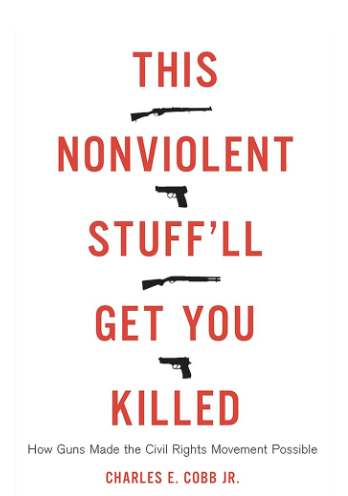
Charles E. Cobb Jr, This Nonviolent Stuff’ll Get You Killed: How Guns Made the Civil Rights Movement Possible, 2015
This Nonviolent Stuff’ll Get You Killed is Charles Cobb’s “richly detailed memoir of his experiences with the Student Nonviolent Coordinating Committee during the civil rights struggles of the 1960s” (The New York Times Book Review). He “describ[es] the vital role that armed self-defense has played in the survival and liberation of black communities,” explaining how non-violence and armed self defense are not mutually exclusive philosophies. Charles E. “Charlie” Cobb Jr. is a journalist, professor, and former activist. In the introduction to the book, he describes his aims well: “In some respects, this book is a way to introduce readers to people and political currents that have never been particularly visible in the history of the civil rights movement… the larger story… is the story of black communities organizing and fighting for change, unwilling to live under white supremacy any longer.”
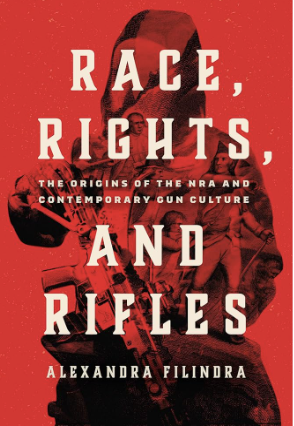
Alexandra Filindra, Race, Rights, and Rifles: The Origins of the NRA and Contemporary Gun Culture, 2023
To understand the state of guns in America requires understanding the history and influence of the NRA. In Race, Rights, and Rifles, Alexandra Filindra, professor of political science, “shows how ascriptive republicanism transforms the right to self-defense—a basic human impulse for survival—into a rallying point for political polarization and a justification for an investment in illiberal democracy,” by tracking the arguments for individual gun ownership over time (Jennifer Carlson, author of Policing the Second Amendment). The book is an “eye-opening examination of the ties between American gun culture and white male supremacy from the American Revolution to today.”
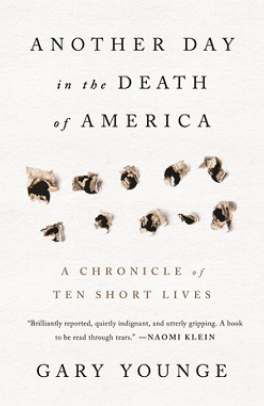
Gary Younge, Another Day in the Death of America: A Chronicle of Ten Short Lives, 2016
On a single day in 2013, ten American children and teenagers were killed by guns. Another Day in the Death of America is the account of this day—when more children died by gun violence than usual, but not by much. Gary Younge is an award-winning journalist and acclaimed author who also happens to be a Brit, “a personable, unusual narrator.” In the New York Times Book Review, the book is described as “exactingly argued, fluidly written and extremely upsetting.” “This is Gary Younge’s masterwork,” says Naomi Klein, author of Doppelganger, “you will never read news reports about gun violence the same way again. Brilliantly reported, quietly indignant and utterly gripping. A book to be read through tears.”
Winner of the 2017 J. Anthony Lukas Prize • Shortlisted for the 2017 Hurston/Wright Foundation Award • Finalist for the 2017 Helen Bernstein Book Award for Excellence in Journalism • Longlisted for the 2017 Andrew Carnegie Medal for Excellence in Non Fiction
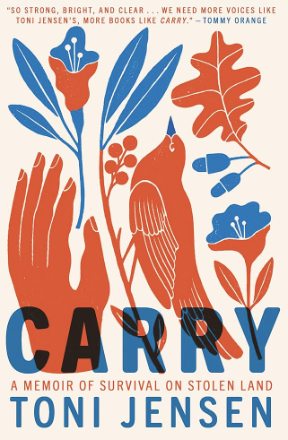
Toni Jensen, Carry: A Memoir of Survival on Stolen Land, 2020
In Carry, Toni Jensen reflects on what it means to exist as an Indigenous woman in America, through snapshots of encounters with gun violence, and yet does so “with a controlled voice like a Philip Glass composition, smooth, meandering yet repetitive” (The New York Times Book Review). Powerful and poetic, Jensen combines the personal and the historical, depicting experiences that are, deplorably, not singular, indeed are endemic to the American experience. “This is America,” she writes, “Everywhere we live, our neighbors may commit gun violence. Everywhere we live, the police may commit gun violence on us or on our neighbors.” “We need more voices like Toni Jensen’s, more books like Carry” (Tommy Orange, author of There There).
New York Times Editors’ Choice • Finalist for the Dayton Literary Peace Prize
